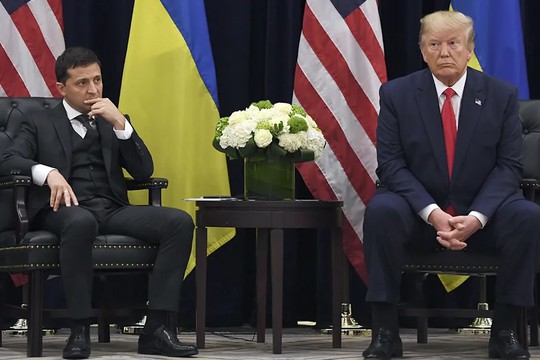Historic photo: Trump meets with Zelensky the year they were both presidents of their countries.
Photo: Getty Images
With Joe Biden riding into the sunset and the presidential campaign drawing to a close, American interest in Ukraine is winding down, too. Europeans talking tough about ‘standing up’ to Russia had better be prepared to do so on their own. The next president will find the domestic pressure to scale back involvement in Ukraine irresistible, writes ‘The Spectator’.
Donald Trump’s campaign message, muddled though it is, bodes ill for the Ukrainian war effort. His patience with this war would not extend 24 hours into his presidency, he warns. For J.D. Vance, Trump’s vice-presidential nominee, the Ukraine war is a mistake the United States should wash its hands of. How much of Ukrainian territory can be regained in any peace negotiations is Ukraine’s problem, not America’s. The Democratic nominee Kamala Harris has a vaguely pro-Ukraine position – one that she has barely mentioned since September. There is a reason for her silence. Americans are no longer as emotional about Ukraine as they were when Russian tanks rolled towards Kyiv in February 2022, and half the country called Russian aggression a ‘major threat’. This summer, a Pew Center poll found that just a third feel that way. Two weeks ago, the Wall Street Journal found that Americans prefer Trump’s Ukraine policy to Harris’s, by 50 per cent to 39. The US ambassador to Nato, Julianne Smith, announced that Washington did not plan to invite Ukraine to join the organisation any time soon.
With each passing week since 2022, the Ukrainian cause has become more a partisan engagement, less a national one. Republican neoconservatives like South Carolina’s Lindsey Graham have lost influence. Volodymyr Zelensky has ever fewer Republican fans. The conservative talk-show host Tucker Carlson complained that Zelensky visits Congress to solicit money ‘dressed like the manager of a strip club’. When Zelensky visited a munitions plant with Pennsylvania’s Democratic governor Josh Shapiro this autumn, Trump spokesmen accused him of interfering in the presidential election.
Since the summer, Ukraine has been tied into a broader complex of issues that drove Biden from the presidential race. Defending Ukraine is costing the US hundreds of billions of dollars at a time when its border with Mexico has been left undefended. As in Britain, America’s Ukraine policy has been carried out through a campaign of war propaganda extravagant enough to undermine the government’s reputation for truth-telling more generally. Ukraine, probably the most corrupt country on the European landmass, is presented to the public as a model democracy. Government pronouncements wildly exaggerate the ratio of Russian to Ukrainian casualties. Frequent allegations that Russia uses ‘misinformation’ to ‘destabilise’ and ‘divide’ our democracy are repurposed for stifling domestic dissent, and discredit the notion of disagreement itself.
The Ukraine war has left the West at high risk of a world conflagration, at a time when the public has little reason to trust that the President has the mental acuity to judge the signals right, or that it is even he who is doing the judging. The Biden administration has been run, in the President’s cognitive absence, by a junta of special interests. In September the US and UK considered using ATACMS and Storm Shadow missiles to strike deep into Russia. Such a shift in policy posed insane risks, which neither government (particularly the UK’s, it must be said) appeared to understand.
The problem is not that the West was butting into Ukraine’s launch decisions. The problem is that Ukraine cannot launch these missiles on its own. They require western radar and targeting. Their use would thus have been a direct Nato attack on Russia, which remains the world’s most heavily armed nuclear power. It remains a dangerous situation, which the Zelensky government has every incentive to escalate, particularly as its own military loses momentum on the battlefield.
The Ukraine war does not appear in the same light at the end of this presidential campaign as it did at the beginning. Be it Harris or Trump, the next president will find the domestic pressure to scale back US involvement irresistible.
read more in our Telegram-channel https://t.me/The_International_Affairs

 11:40 02.11.2024 •
11:40 02.11.2024 •























